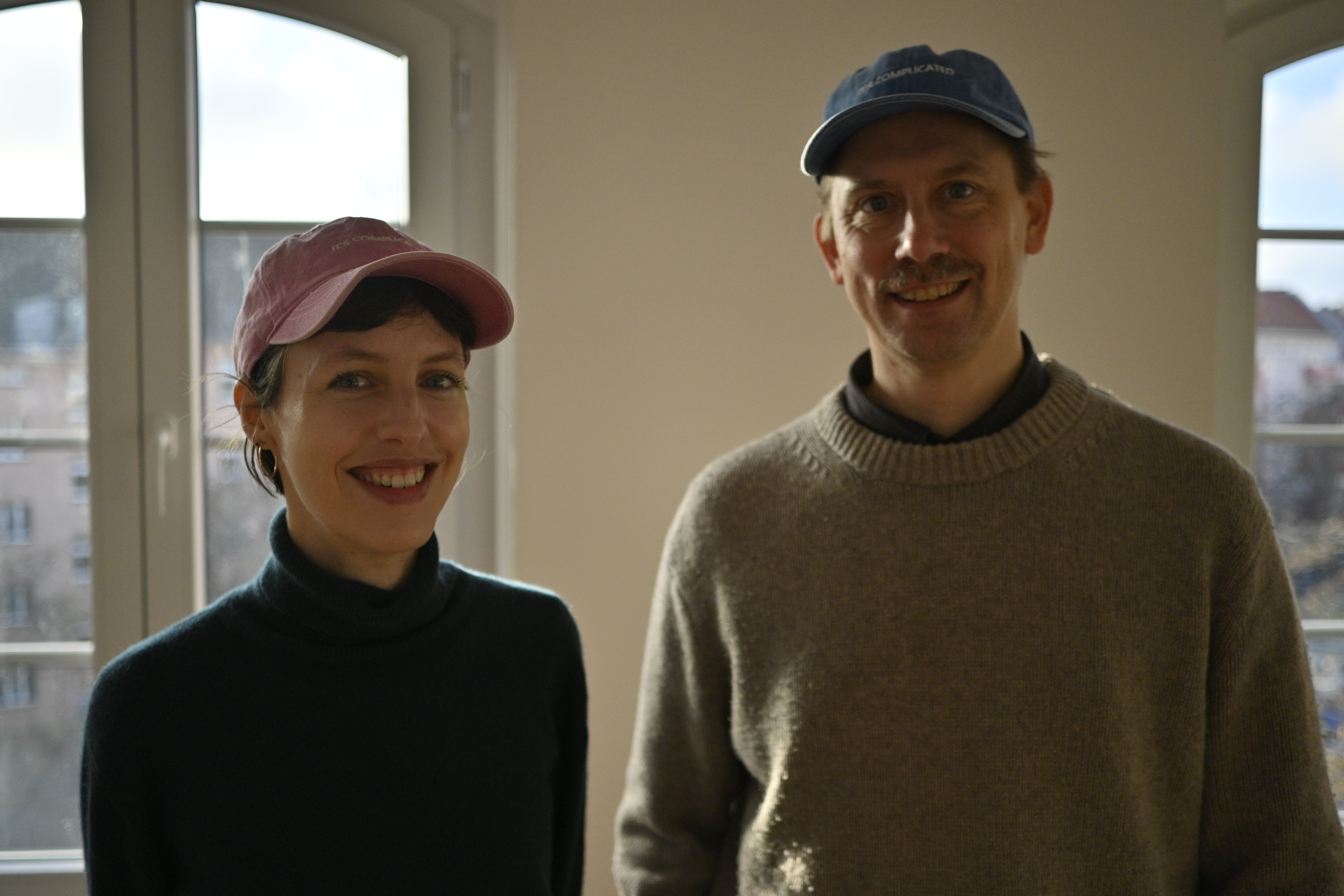Background Conversation

Johanne, Jakob – You founded It’s Complicated. Can you briefly explain what you do?
At its core, we are a marketplace for therapists and people seeking therapy. But we are much more than that: We connect therapists and clients in a way that feels human, personal, and accessible. Our platform isn’t just about helping people find the right therapist – it’s also about fostering a strong professional community. That’s why our strategy is “Therapists First”, which entails prioritizing the needs of our therapists in every decision we make.
You are both experienced therapists. When did you realize that a new platform was needed?
It was the result of two overlapping experiences. On one hand, we were receiving weekly inquiries from therapists wanting to join our community practice in Berlin, and from clients seeking therapy, but we simply didn’t have enough space. We wanted to refer them to a useful website, but at the time, the existing ones were outdated, with no real filters and no way to get to know the person before booking a session. This made finding a truly suitable match difficult.
Which aspects of traditional psychotherapy did you find lacking, and what motivated you to create something new?
Traditional directories rarely allow therapists to present themselves authentically. Also, psychotherapy is often viewed solely as direct client interaction. But what therapists really need goes beyond that: a community, functional tools, and a stable client base. Our platform is designed not just to help therapists survive, but to truly grow and thrive in their practice.
You talk about “Therapists First”. What exactly does that mean?
Unlike many larger platforms like BetterHelp, which prioritize scaling and investors, It’s Complicated is a counter-model focused on therapists’ needs. Many platforms overlook the importance of supporting therapists for long-term, sustainable careers, which helps prevent burnout and ensures high-quality care. We empower therapists to build independent practices, free from big tech companies, improving the quality of therapy for clients. When therapists have good working conditions, they provide better care.
What is it like to build a digital platform while still running your own practice?
The two roles actually complement each other very well. When you work with the clients, therapy is incredibly enriching and energizing but also a highly introverted craft. At the same time, working on It’s Complicated often feels like a creative break from therapy and a room for expressing our more extraverted sides, and vice versa. This balance keeps us motivated.
How did your experience as therapists shape the design of the platform?
We know firsthand how crucial the right connection between therapist and client is. Yet, the search process can be frustrating and discouraging. Endless profiles that all look the same, with little guidance on what to consider. That’s why we designed It’s Complicated to filter not just by qualifications, but also by personality, therapeutic approach and life experience.
What makes you different from other therapy platforms?
It’s Complicated was meant to be different from the start. The mental health landscape is often too clinical or dominated by tech companies with little therapeutic expertise. We wanted to create a platform that feels human – warm and with humor. This is reflected in the name, born from our work with clients, and in the design, with playful, thoughtful details. Even in something as serious as therapy, there’s room for lightness, laughter and connection. Whether through the language we use or the design elements – everything is crafted to make users feel at ease and welcome.
What benefits does It’s Complicated offer to people seeking therapy?
Our platform helps people find therapists who truly match their needs, whether by therapy style, language, or shared identity. It also offers more flexibility: those seeking a niche approach often have more options here than in traditional systems. Many also use It’s Complicated to bridge the waiting period for insurance covered therapy or to take a low-barrier first step into therapy.
What are the biggest challenges for clients seeking therapy?
One of the biggest hurdles is simply getting started. Many don’t know where to begin or what they actually need and even sending that first message can feel like an obstacle. We reduce these barriers by making the process clear and intuitive. Therapy shouldn’t feel like a leap into the unknown but rather a natural next step.
How does your platform help people find the right therapist?
Therapy seekers often feel overwhelmed by too many options. The right filters are missing, and many profiles seem interchangeable. We wanted to change that by enabling searches based on personality, therapeutic approach and shared experiences, not just qualifications. Therapy works best when the chemistry is right, and that’s what we facilitate. Additionally, our matching service combines data with human expertise to create better connections.
Accessibility and diversity are central to your platform. Why was that so important to you?
We’ve both seen how difficult it is for many people to find a therapist who truly understands them – whether due to language, identity, or specific therapy needs. This diversity was lacking in traditional systems, and we wanted to change that.
Therapy is often limited by cost and availability. What solutions do you offer?
We aim to improve both. By creating a space where therapists can build sustainable practices, we increase availability. We also support flexible pricing models, including tiered rates and more affordable options.
How does your platform ensure a safe and supportive environment for clients?
Trust is the foundation of therapy. That’s why transparency is so important to us. Clients should not only see formal qualifications but also get a real sense of the therapist – their approach, style, and philosophy. This builds trust and helps people make informed decisions.
Was there a milestone that was particularly significant for you?
The moment we saw therapists truly using the platform to find clients, connect with colleagues, and build their practices. And when we launched our community events, we realized that this was more than just a directory. It had become a place where people felt a sense of belonging.
How has working on It’s Complicated changed your perspective on therapy?
It has made us even more aware of the systemic challenges – from therapist burnout to rigid structures that limit access to therapy. At the same time, it reinforced our belief that therapy extends beyond the therapy room. It’s about the entire ecosystem surrounding it.
As therapists, how do you take care of your own mental health?
We try to follow the advice we give our clients: set clear boundaries, seek support, and do things that bring us joy. Peer support is particularly important to us: therapists also need connection with those who understand their work.
If you could change one thing about how society views psychotherapy, what would it be?
The expectation that therapists should be selfless, always available, and immune to burnout. The quality of therapy is directly linked to therapists’ well-being. If we want therapy to be as effective as possible, we need an industry where therapists feel supported and can build sustainable careers. A healthy therapist is not a luxury – it’s a prerequisite for good therapy.
Contact:
For more information, feel free to visit our website at www.complicated.life or reach out to our press contact, Antje Jochmann, via email at press@complicated.life.

